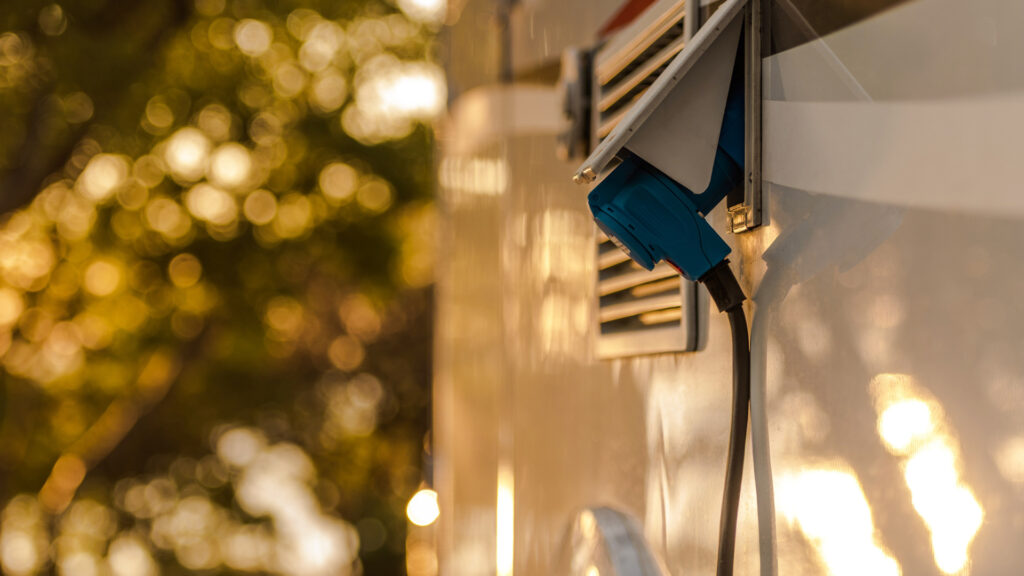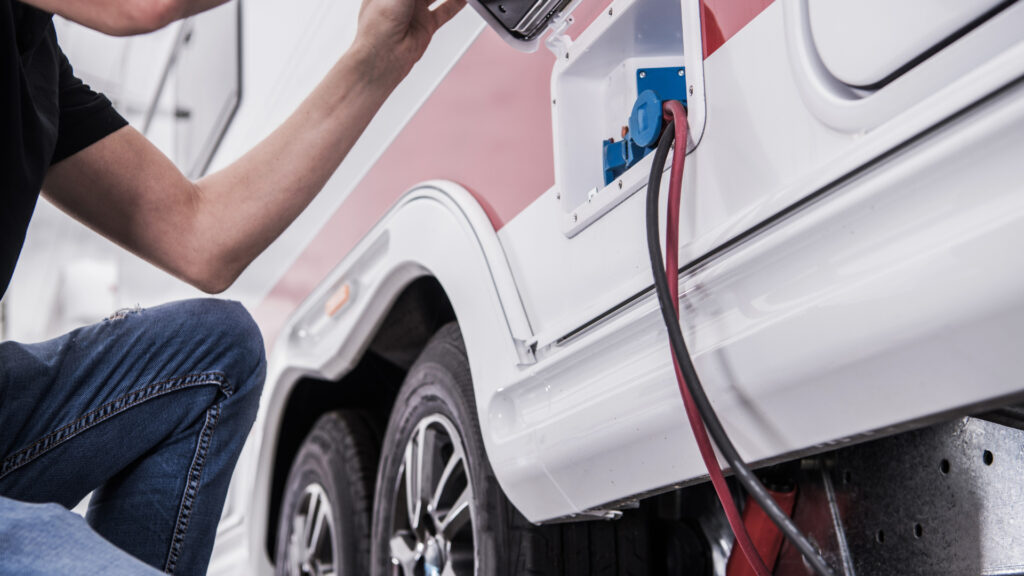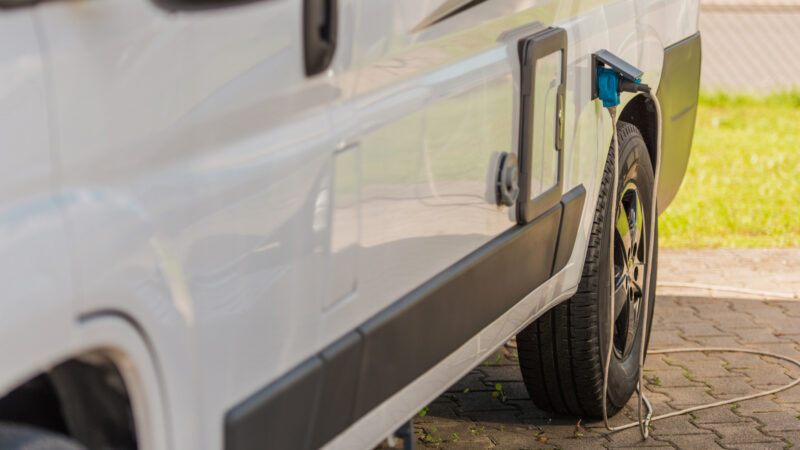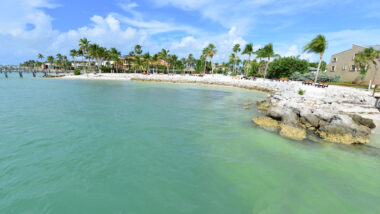Table of Contents Show
RV owners may encounter a melted electrical connection. We’ve seen an increase in the number of posts on social media of owners experiencing this issue. These can be serious safety hazards and lead to dangerous circumstances.
We would hate to see your plans ruined by an avoidable hazard. Luckily, we’ll share some things you can do to avoid risky situations.
Let’s explore some common causes of RV electrical connections melting and some tips on how to prevent this from happening to you.
What Are RV Electrical Connections?
RV electrical connections are how an RV attaches to a power source. They’re between the power cord, power protection devices, and the power source. Most campers require them to run appliances like TVs, air conditioners, and refrigerators.
The most common type of power connection is shore power. This is the outlet where you plug your power cord in at a campsite or RV park. It provides a steady supply of AC power to run all the appliances and systems in the RV.
Unfortunately, these can be extremely dangerous when not used correctly or maintained. It doesn’t matter whether you’re a full-timer or weekend warrior; take care of these connections.
Are Melted RV Electrical Connections Common?
Melted electrical connections in campers are relatively rare. However, they do occur.
We’ve seen an unusual amount of RVers experiencing issues lately. Many owners blame manufacturers when things go wrong with their rigs, but that’s not typically the case in these situations.
We’ll share specifics later about why these occur. However, it’s generally because of user or equipment errors. There are some things you can watch for and do to minimize risks. While you can’t eliminate the dangers, you can drastically reduce them.
What Causes RV Electrical Connections to Melt?
There are typically a few reasons why we see or hear of owners experiencing these issues. Being mindful of these hazards can help you avoid a dangerous situation when plugging in your rig. Let’s take a look!
Overloading
Overloading is one of the common causes of melted RV electrical connections. This occurs when you use too many electrical devices or appliances simultaneously.
Overloading your circuits causes an excessive amount of current to flow through the electrical connections. This high current level generates heat, causing the rubber plugs to melt.
Power-hungry devices like air conditioners, electric heaters, and microwaves are often the culprit in a camper. Knowing the power requirements of each appliance or device you use is essential. This can help you avoid exceeding the capacity of the electrical system.
Loose Connections
Loose connections may also cause issues. When electrical connections are loose, they generate heat. This is due to the resistance in the circuit, causing the metal to expand and contract. Resistance can lead to arcing, which causes heat buildup at the connection point.
Over time, this can lead to the melting of the plug and metal contact points. It’s essential to ensure solid connections when plugging in your rig. This includes the power source and where the power cord attaches to your RV.

Corrosion
Corrosion is one of the primary causes of electrical connections melting in RVs.
Moisture and other contaminants can build up on the metal surfaces. This leads to a chemical reaction that causes the metal to rust. This corrosion can weaken the connection, causing it to heat up and melt.
A few factors contribute to this corrosion. Typically, exposure to moisture is one of the most significant. The metal surfaces rust, deteriorate, and become a major problem.
High levels of humidity can also contribute to corrosion. Keeping your equipment away from the elements and in tip-top shape is essential to stay safe.
Pro Tip: If you just purchased your first RV, check out our RV Electrical Hookup Guide for Newbies!
Not Using a Surge Protector
One of the leading causes of RV electrical connections melting is not using a surge protector. These devices protect the electrical system from power surges caused by fluctuations in voltage.
Without a surge protector, the electrical system is vulnerable to power surges, which result in overheating and eventually melting electrical connections.
Power surges can result from lightning strikes, power grid failures, and electrical storms. These events can cause a power surge capable of melting sensitive connections without a surge protector. Always use a surge protector when plugging in your rig.
How to Avoid Your RV Electrical Connection Melting
Luckily, you can protect your investment in a handful of ways. Unfortunately, there’s no way to prevent every situation. However, you can drastically reduce your chances by following these tips.
Do Regular Inspections
You can drastically reduce potential dangers by doing regular inspections. Pay close attention to the condition of the wiring and various connections. Look for any signs of corrosion, rust, or discoloration.
It’s also crucial that you inspect your power cord. Look for any signs of damage or cuts in the rubber protective coating. To minimize the chances of electrocution, perform this check with your cord unplugged.
When plugging in your cord, ensure everything is tight. Don’t ignore it if something feels loose. Contact management before plugging in if the campground’s power pedestal is damaged or things don’t plug in well.

Use a Surge Protector With EMS
A surge protector is one of the most effective ways to prevent electrical connections from melting in an RV.
When it comes to these products, you typically get what you pay for. We recommend upgrading to a surge protector with an electrical management system (EMS) to provide optimum protection.
These devices protect against power surges and monitor the incoming power supply. It automatically shuts off if the unit detects unsafe conditions. It provides comprehensive protection and drastically reduces many issues that could cause connections to melt.
- Surge Protection: Protects electronics from power surges and spikes
- 50 Amp Capacity: Provides ample power for high-demand devices
Watch Your Power
When using a camper, you must remain mindful of your power usage. You can easily use too much power by accident. This typically occurs when using multiple air conditioners, space heaters, or cooking appliances.
Pushing your electrical system to the max can reveal potential issues. While you may have safety features in place, they can fail. It’s better to be safe than sorry, and always stay aware of how much power you consume in your RV.
Keep in Mind: Wondering how you can plug in your RV at home? Here’s how!
Keep Connections Dry
Keep your power cable and other connections in good condition by keeping them dry.
Moisture can destroy the metal prongs and other sensitive pieces in your system. Store your power cable in a dry environment when not in use, and keep the camper’s power connection closed.
Unfortunately, mother nature won’t always cooperate during your adventures. Watch for pooling water near your electrical connections. You may need to place your power cord on an object to keep it off the ground and out of the water.
Keep Your RV Electrical Connections from Melting
A melted RV electrical connection can cause significant damage to your rig. It could even result in a deadly and dangerous fire, which would only take minutes to consume your rig completely.
To avoid a potential disaster, inspect your connections regularly and maintain them. If you do, you’ll give yourself and your RV the best chance of enjoying a safe camping experience.
Last update on 2025-01-19 / Affiliate links / Images from Amazon Product Advertising API







